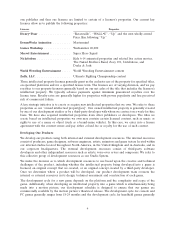THQ 2009 Annual Report Download - page 21
Download and view the complete annual report
Please find page 21 of the 2009 THQ annual report below. You can navigate through the pages in the report by either clicking on the pages listed below, or by using the keyword search tool below to find specific information within the annual report.products, leaving less space to sell our products. Since the life cycle of a game is short, strong sales of our
competitors’ games could negatively affect the sales of our games.
Development of software by hardware manufacturers may lead to reduced sales of our products.
Microsoft, Nintendo and Sony each develop software for their own hardware platforms. As a result of their
commanding positions in the industry, the hardware manufacturers may have better bargaining positions
with respect to retail pricing, shelf space and retailer accommodations than do any of their licensees,
including us. Additionally, the manufacturers can bundle their software with their hardware, creating less
demand for individual sales of our products. In the past twelve months, Nintendo’s market share on the
Wii and DS has been over 50% of all software sales for these platforms. Continued or increased
dominance of software sales by the hardware manufacturers may lead to reduced sales of our products and
thus lower revenues.
Increased development of software and online games by intellectual property owners may lead to reduced
revenues.
As discussed above, a significant portion of our revenue is due to sales of games based upon licensed
properties. In recent years, some of our key licensors, including Disney and Viacom, have increased their
development of video games, which could lead to such licensors not renewing our licenses to publish games
based upon their properties that we currently publish or not granting future licenses to us to develop
games based on their other properties. For example, in fiscal 2009, Disney decided to develop internally
video games based upon its upcoming movie Toy Story 3 rather than granting the license to develop and
publish the game to an external publisher such as us. If intellectual property owners continue expanding
internal efforts to develop video games based upon properties that they own rather than renewing our
licenses or granting us additional licenses, our revenue could be significantly affected.
Competition for licenses may negatively affect our profitability.
Some of our competitors have greater name recognition among consumers and licensors of properties, a
broader product line, or greater financial, marketing and other resources than we do. Accordingly, these
competitors may be able to market their products more effectively or make larger offers or guarantees in
connection with the acquisition of licensed properties. As competition for popular properties increases,
our cost of acquiring licenses for such properties may increase, resulting in reduced margins.
Competition with emerging forms of home-based entertainment may reduce sales of our products.
We also compete with other forms of entertainment and leisure activities. For example, we believe the
overall growth in the use of the internet and online services by consumers may pose a competitive threat if
customers and potential customers spend less of their available time using interactive entertainment
software and more using the internet and online services.
Competition for qualified personnel is intense in the interactive software entertainment industry and
failure to hire and retain qualified personnel could seriously harm our business.
We rely to a substantial extent on the management, marketing, sales, technical and software development
skills of a limited number of employees to formulate and implement our business plan. Our success
depends to a significant extent upon our ability to attract and retain key personnel. Competition for
employees can be intense and the process of locating key personnel with the right combination of skills is
often lengthy. The loss of services of key personnel could have a material adverse effect on our business.
14
























